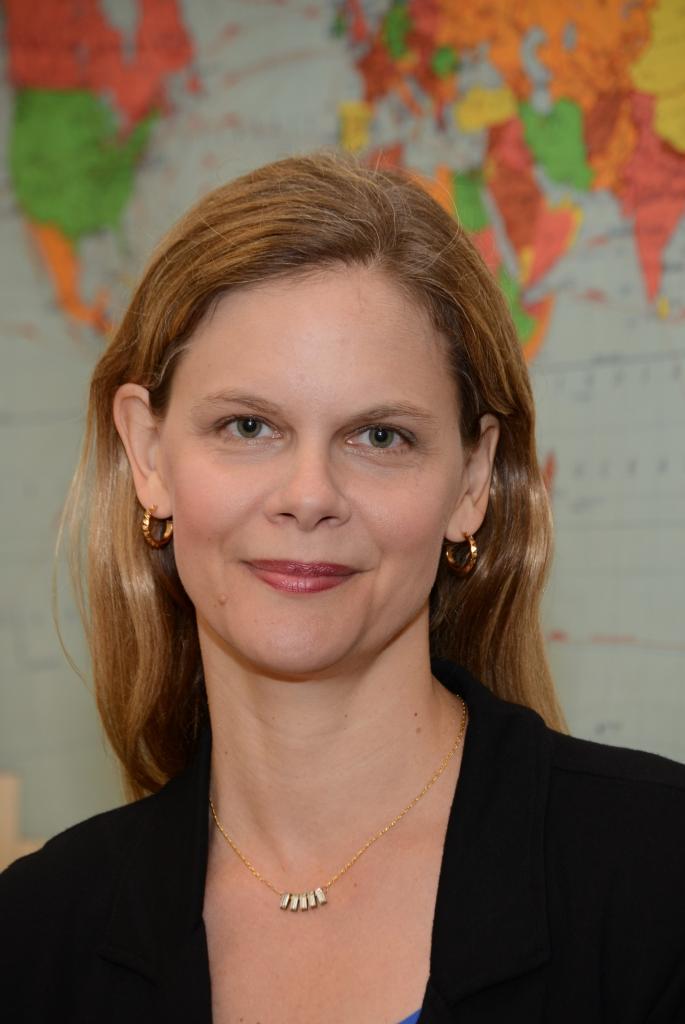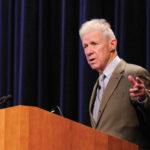After donor pressure, Beverly Gage resigns as Grand Strategy director
“This is not a pay-to-play institution,” the professor said in response to prominent conservative donors seeking to appoint an advisory board to address the course’s teaching.

Yale News
Updates, Friday, October 1:
In the wake of Beverly Gage’s resignation from the Grand Strategy program’s directorship, faculty coalitions have voiced support for her decision.
The Faculty of Arts and Sciences Senate has promised a full investigation, while University President Peter Salovey has publicly pledged Yale’s commitment to ideological diversity.
“The Senate is highly concerned regarding the news that Professor Gage has resigned as Grand Strategy Director due to pressure from donors to control the curriculum of the program,” a Friday morning statement from FAS Senate Chair Valerie Horsley reads. “The Senate will investigate this situation and will issue a plan for further action in the coming weeks.”
The statement describes the issue as one of free expression on campus, referencing a portion of Yale’s faculty handbook, which calls on the University to guarantee intellectual freedom.
Yale’s history department, where Gage remains a tenured professor, issued a statement of its own Friday morning criticizing the planned creation of an advisory board to influence guest practitioner appointments to the Grand Strategy program.
“No faculty member should have their courses or programs under outside surveillance,” the department’s statement reads. “We would like explicit reassurance that the university administration will protect the academic freedom of all faculty members and the integrity of all departments, programs, centers, and institutes on our campus.”
The dissent was not confined to the History Department, with professors across multiple disciplines using social media to criticize Yale administrators for not appropriately protecting academic freedom on campus.
Salovey responded with a statement, assuring faculty members of Yale’s commitment to ideological diversity. He said he would give “careful consideration” to the aim of preserving academic freedom while engaging with donors, particularly in light of the University’s upcoming fundraising campaign, which is slated to start Oct. 2.
“For everyone’s benefit, I should have tried harder to improve the situation,” Salovey wrote. “I have unqualified respect and admiration for Professor Gage, and I am genuinely sorry that she did experience more unsolicited input from donors than faculty members should reasonably be expected to accept.”
Read below for the original story:
Prominent 20th-century historian and professor Beverly Gage said that she will step down as director of Yale’s Brady-Johnson Program in Grand Strategy in December. She cited the Yale administration’s failure to stave off inappropriate influence over the course from the program’s donors.
The Grand Strategy program, a year-long statecraft and politics course that accepts about 20 undergraduate and graduate students, was largely funded by two donors — Nicholas F. Brady ’52, a former United States treasury secretary under former Presidents Ronald Reagan and George H.W. Bush, and conservative donor Charles B. Johnson ’54, who gave the largest donation in Yale’s history.
Gage, a tenured history professor who was recently nominated to President Biden’s National Council on the Humanities, began steering the program in 2017. Her efforts, she told the News, have been focused on both preserving Grand Strategy’s strengths and expanding the curriculum to include domestic policy and grassroots social movements.
Her resignation in March, which was publicly announced Thursday morning in the New York Times, is a direct reaction to the two donors’ attempts to influence the course by instituting an advisory board to oversee the program that would have included conservative figures such as former U.S. Secretary of State Henry Kissinger.
Gage’s resignation raises complex questions about free expression and the influence donors exercise on University campuses.
“This is not a pay-to-play institution,” Gage told the News in an interview. “That is not how you get to influence the curriculum — you want people who have expertise, pedagogy, skills making those kinds of decisions.”
For years, Gage said, Brady and Johnson did not attempt to influence the program’s curriculum or slate of lecturers. But after the 2020 presidential election, a Times op-ed by professor of political science and humanities Bryan Garsten, who previously co-taught Grand Strategy with Gage, prompted Brady to begin pushing for changes to the program. The Times reported that Brady told Gage that she had not been teaching it “the way Henry Kissinger would.”
“That’s absolutely right,” she responded. “I am not teaching Grand Strategy the way Henry Kissinger would.”
In the months following the publication of Garsten’s op-ed, the University moved to institute a new advisory board to recommend practitioners to the course. To do so, Yale seized on a previously unused measure in the bylaws of the 2006 gift agreement allowing for an external five-member “board of visitors” to advise on practitioner appointments. Brady and Johnson suggested several members who were ultimately chosen to join the advisory board. These people included Kissinger, who served under former President Richard Nixon, as well as Stephen J. Hadley, former national security adviser to George W. Bush and Thomas H. Kean, the former Republican governor of New Jersey.
Garsten told the News that he “fully support[s]” Gage’s decision to resign, and he will not be teaching Grand Strategy anymore.
Vice Provost for Academic Affairs Pericles Lewis told the News that Yale had a legal obligation to create the board, in accordance with the 2006 gift agreement. According to the Times, upon learning of the legal agreement, Gage acquiesced, but insisted that the board include diversity across ideological, gender and racial lines.
“He represents the opposite of the generational shift I have been trying to make,” Gage told the Times about Kissinger. Kissinger did not immediately respond to multiple phone calls on Thursday.
Gage told the Times that throughout the months-long deliberation regarding the advisory board, she pushed University administrators to include more diversity on the board, threatening to resign her post should they not follow through.
In March, University President Peter Salovey announced the new board, which included the conservative slate of members suggested by Johnson and other donors. The Times reported that the board did not include any members with a background in social activism — at the donors’ request.
Soon after, Gage followed through on her threatened resignation.
“I have the greatest respect for Professor Gage’s excellent leadership of the program over the past four years,” Salovey wrote in an email to the News. “We have consulted and will continue to consult faculty in the program concerning her successor.”
Lewis denied that the donors had exerted undue influence over the program. The two donors expressed a “strong desire” for Kissinger to join the board but did not pick additional members, he told the Times.
Following the news of Gage’s resignation, some University professors spoke out in her defense on social media.
“This is hugely disappointing for a program in which I have guest taught, should concern people of all political views, and remind us that donors are welcome to patronize academic life without dictating content,” Yale Law School professor Samuel Moyn wrote on Twitter. He called Gage a “hero.”
History professor John Lewis Gaddis, one of the co-founders of the Grand Strategy program, told the News that “the Yale administration could have made it unambiguously clear to the donors that the faculty shape the curriculum. The administration should now, equally unambiguously, commit itself and recommit this institution to this fundamental principle.”
Durel Crosby ’22, a current student in the Grand Strategy program, told the News that when he heard about Gage’s resignation on Thursday morning, he was shocked.
He further added that he felt a “sense of loss” for the students who will participate in the program in the future and not get to experience Gage’s teaching.
Crosby said that the loss of Gage would put in jeopardy the diversity of opinion that the course created and would potentially “deter” certain students who bring that diversity.
Gage told the News that she is not seeking reinstatement to the program. In a series of tweets posted Thursday morning, Gage also wrote that she is “grateful to the program’s founders, [history professors] John Gaddis and Paul Kennedy, for their steadfast support over many years.” She continued, expressing her appreciation for the students in the program who have “made teaching in the Grand Strategy Program such an adventure and a delight.”
Gage added that she would continue to serve as a history professor at Yale.
No successor has been named so far. History lecturer Michael Brenes, the associate director of Grand Strategy, told the News that Gage’s efforts had diversified the program’s curriculum and student body.
“Professor Gage’s resignation is upsetting, but I believe strongly that faculty autonomy and academic freedom is essential for vibrant teaching within America’s universities,” Brenes told the News.
The program recently invited former defense secretary James N. Mattis and racial justice activist Heather McGhee as guest teachers and speakers.
This story was updated to include information from Gage, Lewis, Brenes, Garsten and Salovey.









